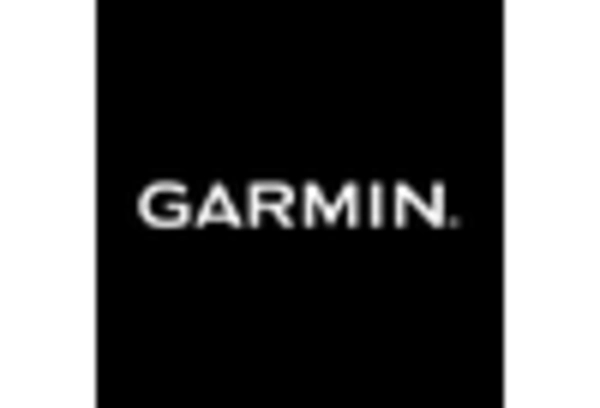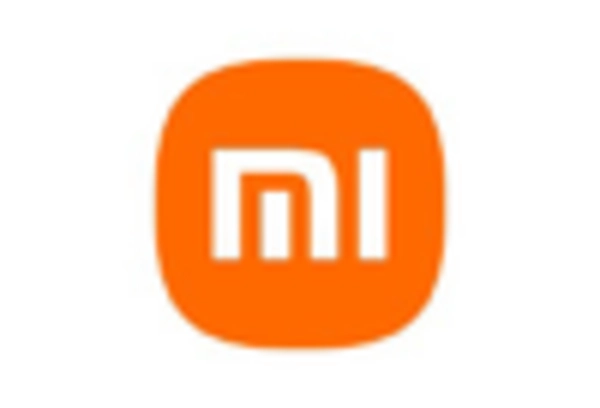Wearable Fitness Trackers
Smartwatches
Fitness Bands
Heart Rate Monitors
Activity Tracking
Health Monitoring
Sleep Tracking
Fitness Coaching
Online Retail
Offline Retail
Direct Sales
Individuals
Fitness Enthusiasts
Healthcare Professionals
North America
Europe
South America
Asia Pacific
Middle East and Africa
North America Outlook (USD Billion, 2019-2035)
Fitness Tracker Market by Product Type
Wearable Fitness Trackers
Smartwatches
Fitness Bands
Heart Rate Monitors
Fitness Tracker Market by Application Type
Activity Tracking
Health Monitoring
Sleep Tracking
Fitness Coaching
Fitness Tracker Market by Distribution Channel Type
Online Retail
Offline Retail
Direct Sales
Fitness Tracker Market by End User Type
Individuals
Fitness Enthusiasts
Healthcare Professionals
Fitness Tracker Market by Regional Type
US
Canada
US Outlook (USD Billion, 2019-2035)
Fitness Tracker Market by Product Type
Wearable Fitness Trackers
Smartwatches
Fitness Bands
Heart Rate Monitors
Fitness Tracker Market by Application Type
Activity Tracking
Health Monitoring
Sleep Tracking
Fitness Coaching
Fitness Tracker Market by Distribution Channel Type
Online Retail
Offline Retail
Direct Sales
Fitness Tracker Market by End User Type
Individuals
Fitness Enthusiasts
Healthcare Professionals
CANADA Outlook (USD Billion, 2019-2035)
Fitness Tracker Market by Product Type
Wearable Fitness Trackers
Smartwatches
Fitness Bands
Heart Rate Monitors
Fitness Tracker Market by Application Type
Activity Tracking
Health Monitoring
Sleep Tracking
Fitness Coaching
Fitness Tracker Market by Distribution Channel Type
Online Retail
Offline Retail
Direct Sales
Fitness Tracker Market by End User Type
Individuals
Fitness Enthusiasts
Healthcare Professionals
Europe Outlook (USD Billion, 2019-2035)
Fitness Tracker Market by Product Type
Wearable Fitness Trackers
Smartwatches
Fitness Bands
Heart Rate Monitors
Fitness Tracker Market by Application Type
Activity Tracking
Health Monitoring
Sleep Tracking
Fitness Coaching
Fitness Tracker Market by Distribution Channel Type
Online Retail
Offline Retail
Direct Sales
Fitness Tracker Market by End User Type
Individuals
Fitness Enthusiasts
Healthcare Professionals
Fitness Tracker Market by Regional Type
Germany
UK
France
Russia
Italy
Spain
Rest of Europe
GERMANY Outlook (USD Billion, 2019-2035)
Fitness Tracker Market by Product Type
Wearable Fitness Trackers
Smartwatches
Fitness Bands
Heart Rate Monitors
Fitness Tracker Market by Application Type
Activity Tracking
Health Monitoring
Sleep Tracking
Fitness Coaching
Fitness Tracker Market by Distribution Channel Type
Online Retail
Offline Retail
Direct Sales
Fitness Tracker Market by End User Type
Individuals
Fitness Enthusiasts
Healthcare Professionals
UK Outlook (USD Billion, 2019-2035)
Fitness Tracker Market by Product Type
Wearable Fitness Trackers
Smartwatches
Fitness Bands
Heart Rate Monitors
Fitness Tracker Market by Application Type
Activity Tracking
Health Monitoring
Sleep Tracking
Fitness Coaching
Fitness Tracker Market by Distribution Channel Type
Online Retail
Offline Retail
Direct Sales
Fitness Tracker Market by End User Type
Individuals
Fitness Enthusiasts
Healthcare Professionals
FRANCE Outlook (USD Billion, 2019-2035)
Fitness Tracker Market by Product Type
Wearable Fitness Trackers
Smartwatches
Fitness Bands
Heart Rate Monitors
Fitness Tracker Market by Application Type
Activity Tracking
Health Monitoring
Sleep Tracking
Fitness Coaching
Fitness Tracker Market by Distribution Channel Type
Online Retail
Offline Retail
Direct Sales
Fitness Tracker Market by End User Type
Individuals
Fitness Enthusiasts
Healthcare Professionals
RUSSIA Outlook (USD Billion, 2019-2035)
Fitness Tracker Market by Product Type
Wearable Fitness Trackers
Smartwatches
Fitness Bands
Heart Rate Monitors
Fitness Tracker Market by Application Type
Activity Tracking
Health Monitoring
Sleep Tracking
Fitness Coaching
Fitness Tracker Market by Distribution Channel Type
Online Retail
Offline Retail
Direct Sales
Fitness Tracker Market by End User Type
Individuals
Fitness Enthusiasts
Healthcare Professionals
ITALY Outlook (USD Billion, 2019-2035)
Fitness Tracker Market by Product Type
Wearable Fitness Trackers
Smartwatches
Fitness Bands
Heart Rate Monitors
Fitness Tracker Market by Application Type
Activity Tracking
Health Monitoring
Sleep Tracking
Fitness Coaching
Fitness Tracker Market by Distribution Channel Type
Online Retail
Offline Retail
Direct Sales
Fitness Tracker Market by End User Type
Individuals
Fitness Enthusiasts
Healthcare Professionals
SPAIN Outlook (USD Billion, 2019-2035)
Fitness Tracker Market by Product Type
Wearable Fitness Trackers
Smartwatches
Fitness Bands
Heart Rate Monitors
Fitness Tracker Market by Application Type
Activity Tracking
Health Monitoring
Sleep Tracking
Fitness Coaching
Fitness Tracker Market by Distribution Channel Type
Online Retail
Offline Retail
Direct Sales
Fitness Tracker Market by End User Type
Individuals
Fitness Enthusiasts
Healthcare Professionals
REST OF EUROPE Outlook (USD Billion, 2019-2035)
Fitness Tracker Market by Product Type
Wearable Fitness Trackers
Smartwatches
Fitness Bands
Heart Rate Monitors
Fitness Tracker Market by Application Type
Activity Tracking
Health Monitoring
Sleep Tracking
Fitness Coaching
Fitness Tracker Market by Distribution Channel Type
Online Retail
Offline Retail
Direct Sales
Fitness Tracker Market by End User Type
Individuals
Fitness Enthusiasts
Healthcare Professionals
APAC Outlook (USD Billion, 2019-2035)
Fitness Tracker Market by Product Type
Wearable Fitness Trackers
Smartwatches
Fitness Bands
Heart Rate Monitors
Fitness Tracker Market by Application Type
Activity Tracking
Health Monitoring
Sleep Tracking
Fitness Coaching
Fitness Tracker Market by Distribution Channel Type
Online Retail
Offline Retail
Direct Sales
Fitness Tracker Market by End User Type
Individuals
Fitness Enthusiasts
Healthcare Professionals
Fitness Tracker Market by Regional Type
China
India
Japan
South Korea
Malaysia
Thailand
Indonesia
Rest of APAC
CHINA Outlook (USD Billion, 2019-2035)
Fitness Tracker Market by Product Type
Wearable Fitness Trackers
Smartwatches
Fitness Bands
Heart Rate Monitors
Fitness Tracker Market by Application Type
Activity Tracking
Health Monitoring
Sleep Tracking
Fitness Coaching
Fitness Tracker Market by Distribution Channel Type
Online Retail
Offline Retail
Direct Sales
Fitness Tracker Market by End User Type
Individuals
Fitness Enthusiasts
Healthcare Professionals
INDIA Outlook (USD Billion, 2019-2035)
Fitness Tracker Market by Product Type
Wearable Fitness Trackers
Smartwatches
Fitness Bands
Heart Rate Monitors
Fitness Tracker Market by Application Type
Activity Tracking
Health Monitoring
Sleep Tracking
Fitness Coaching
Fitness Tracker Market by Distribution Channel Type
Online Retail
Offline Retail
Direct Sales
Fitness Tracker Market by End User Type
Individuals
Fitness Enthusiasts
Healthcare Professionals
JAPAN Outlook (USD Billion, 2019-2035)
Fitness Tracker Market by Product Type
Wearable Fitness Trackers
Smartwatches
Fitness Bands
Heart Rate Monitors
Fitness Tracker Market by Application Type
Activity Tracking
Health Monitoring
Sleep Tracking
Fitness Coaching
Fitness Tracker Market by Distribution Channel Type
Online Retail
Offline Retail
Direct Sales
Fitness Tracker Market by End User Type
Individuals
Fitness Enthusiasts
Healthcare Professionals
SOUTH KOREA Outlook (USD Billion, 2019-2035)
Fitness Tracker Market by Product Type
Wearable Fitness Trackers
Smartwatches
Fitness Bands
Heart Rate Monitors
Fitness Tracker Market by Application Type
Activity Tracking
Health Monitoring
Sleep Tracking
Fitness Coaching
Fitness Tracker Market by Distribution Channel Type
Online Retail
Offline Retail
Direct Sales
Fitness Tracker Market by End User Type
Individuals
Fitness Enthusiasts
Healthcare Professionals
MALAYSIA Outlook (USD Billion, 2019-2035)
Fitness Tracker Market by Product Type
Wearable Fitness Trackers
Smartwatches
Fitness Bands
Heart Rate Monitors
Fitness Tracker Market by Application Type
Activity Tracking
Health Monitoring
Sleep Tracking
Fitness Coaching
Fitness Tracker Market by Distribution Channel Type
Online Retail
Offline Retail
Direct Sales
Fitness Tracker Market by End User Type
Individuals
Fitness Enthusiasts
Healthcare Professionals
THAILAND Outlook (USD Billion, 2019-2035)
Fitness Tracker Market by Product Type
Wearable Fitness Trackers
Smartwatches
Fitness Bands
Heart Rate Monitors
Fitness Tracker Market by Application Type
Activity Tracking
Health Monitoring
Sleep Tracking
Fitness Coaching
Fitness Tracker Market by Distribution Channel Type
Online Retail
Offline Retail
Direct Sales
Fitness Tracker Market by End User Type
Individuals
Fitness Enthusiasts
Healthcare Professionals
INDONESIA Outlook (USD Billion, 2019-2035)
Fitness Tracker Market by Product Type
Wearable Fitness Trackers
Smartwatches
Fitness Bands
Heart Rate Monitors
Fitness Tracker Market by Application Type
Activity Tracking
Health Monitoring
Sleep Tracking
Fitness Coaching
Fitness Tracker Market by Distribution Channel Type
Online Retail
Offline Retail
Direct Sales
Fitness Tracker Market by End User Type
Individuals
Fitness Enthusiasts
Healthcare Professionals
REST OF APAC Outlook (USD Billion, 2019-2035)
Fitness Tracker Market by Product Type
Wearable Fitness Trackers
Smartwatches
Fitness Bands
Heart Rate Monitors
Fitness Tracker Market by Application Type
Activity Tracking
Health Monitoring
Sleep Tracking
Fitness Coaching
Fitness Tracker Market by Distribution Channel Type
Online Retail
Offline Retail
Direct Sales
Fitness Tracker Market by End User Type
Individuals
Fitness Enthusiasts
Healthcare Professionals
South America Outlook (USD Billion, 2019-2035)
Fitness Tracker Market by Product Type
Wearable Fitness Trackers
Smartwatches
Fitness Bands
Heart Rate Monitors
Fitness Tracker Market by Application Type
Activity Tracking
Health Monitoring
Sleep Tracking
Fitness Coaching
Fitness Tracker Market by Distribution Channel Type
Online Retail
Offline Retail
Direct Sales
Fitness Tracker Market by End User Type
Individuals
Fitness Enthusiasts
Healthcare Professionals
Fitness Tracker Market by Regional Type
Brazil
Mexico
Argentina
Rest of South America
BRAZIL Outlook (USD Billion, 2019-2035)
Fitness Tracker Market by Product Type
Wearable Fitness Trackers
Smartwatches
Fitness Bands
Heart Rate Monitors
Fitness Tracker Market by Application Type
Activity Tracking
Health Monitoring
Sleep Tracking
Fitness Coaching
Fitness Tracker Market by Distribution Channel Type
Online Retail
Offline Retail
Direct Sales
Fitness Tracker Market by End User Type
Individuals
Fitness Enthusiasts
Healthcare Professionals
MEXICO Outlook (USD Billion, 2019-2035)
Fitness Tracker Market by Product Type
Wearable Fitness Trackers
Smartwatches
Fitness Bands
Heart Rate Monitors
Fitness Tracker Market by Application Type
Activity Tracking
Health Monitoring
Sleep Tracking
Fitness Coaching
Fitness Tracker Market by Distribution Channel Type
Online Retail
Offline Retail
Direct Sales
Fitness Tracker Market by End User Type
Individuals
Fitness Enthusiasts
Healthcare Professionals
ARGENTINA Outlook (USD Billion, 2019-2035)
Fitness Tracker Market by Product Type
Wearable Fitness Trackers
Smartwatches
Fitness Bands
Heart Rate Monitors
Fitness Tracker Market by Application Type
Activity Tracking
Health Monitoring
Sleep Tracking
Fitness Coaching
Fitness Tracker Market by Distribution Channel Type
Online Retail
Offline Retail
Direct Sales
Fitness Tracker Market by End User Type
Individuals
Fitness Enthusiasts
Healthcare Professionals
REST OF SOUTH AMERICA Outlook (USD Billion, 2019-2035)
Fitness Tracker Market by Product Type
Wearable Fitness Trackers
Smartwatches
Fitness Bands
Heart Rate Monitors
Fitness Tracker Market by Application Type
Activity Tracking
Health Monitoring
Sleep Tracking
Fitness Coaching
Fitness Tracker Market by Distribution Channel Type
Online Retail
Offline Retail
Direct Sales
Fitness Tracker Market by End User Type
Individuals
Fitness Enthusiasts
Healthcare Professionals
MEA Outlook (USD Billion, 2019-2035)
Fitness Tracker Market by Product Type
Wearable Fitness Trackers
Smartwatches
Fitness Bands
Heart Rate Monitors
Fitness Tracker Market by Application Type
Activity Tracking
Health Monitoring
Sleep Tracking
Fitness Coaching
Fitness Tracker Market by Distribution Channel Type
Online Retail
Offline Retail
Direct Sales
Fitness Tracker Market by End User Type
Individuals
Fitness Enthusiasts
Healthcare Professionals
Fitness Tracker Market by Regional Type
GCC Countries
South Africa
Rest of MEA
GCC COUNTRIES Outlook (USD Billion, 2019-2035)
Fitness Tracker Market by Product Type
Wearable Fitness Trackers
Smartwatches
Fitness Bands
Heart Rate Monitors
Fitness Tracker Market by Application Type
Activity Tracking
Health Monitoring
Sleep Tracking
Fitness Coaching
Fitness Tracker Market by Distribution Channel Type
Online Retail
Offline Retail
Direct Sales
Fitness Tracker Market by End User Type
Individuals
Fitness Enthusiasts
Healthcare Professionals
SOUTH AFRICA Outlook (USD Billion, 2019-2035)
Fitness Tracker Market by Product Type
Wearable Fitness Trackers
Smartwatches
Fitness Bands
Heart Rate Monitors
Fitness Tracker Market by Application Type
Activity Tracking
Health Monitoring
Sleep Tracking
Fitness Coaching
Fitness Tracker Market by Distribution Channel Type
Online Retail
Offline Retail
Direct Sales
Fitness Tracker Market by End User Type
Individuals
Fitness Enthusiasts
Healthcare Professionals
REST OF MEA Outlook (USD Billion, 2019-2035)
Fitness Tracker Market by Product Type
Wearable Fitness Trackers
Smartwatches
Fitness Bands
Heart Rate Monitors
Fitness Tracker Market by Application Type
Activity Tracking
Health Monitoring
Sleep Tracking
Fitness Coaching
Fitness Tracker Market by Distribution Channel Type
Online Retail
Offline Retail
Direct Sales
Fitness Tracker Market by End User Type
Individuals
Fitness Enthusiasts
Healthcare Professionals

















Leave a Comment